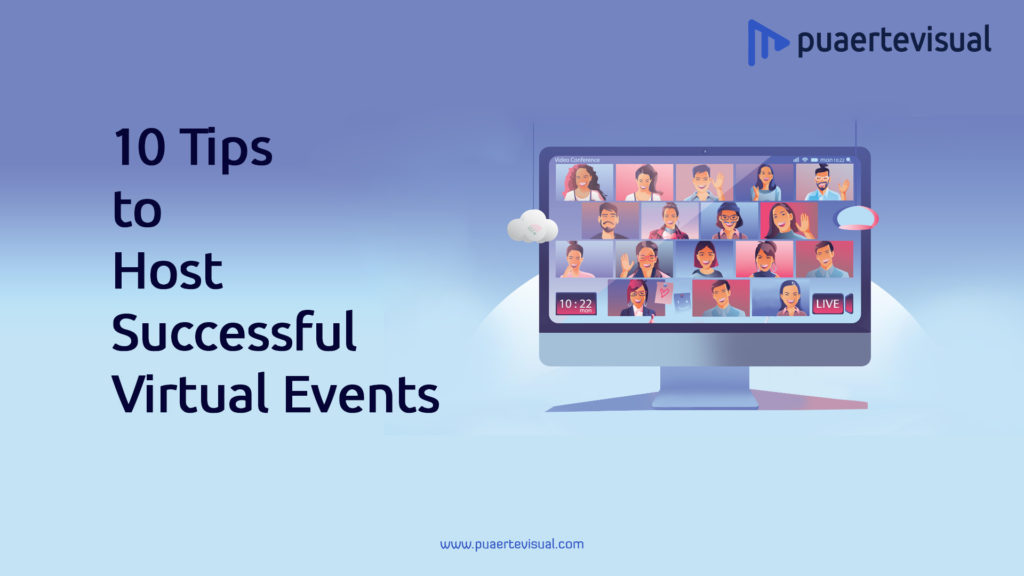
Virtual Events are what the future holds for everyone, be it small companies or big, conferences or small meetings, an Annual Meeting, or a briefing. And with all of this, the question of “How do I host a successful virtual event ? ” arises.
Here is what we suggest :
1) Set clear objectives from the beginning
Make sure you know why you want to organize an event before you start preparing the agenda or choosing the finest virtual event platform. Set SMART goals and make sure the entire project team understands what you intend to accomplish.
2) Select a platform for virtual events

A successful event will require the use of the correct virtual event platform. Do your homework before making any major decisions. Check to see if the platform you chose can genuinely carry out your concept. Also, search for a platform that provides real-time analytics and metrics, as well as the ability for participants to converse with one another.
Here are few questions you can ask yourself before choosing the relevant virtual event platform for your event
- Is real-time, two-way communication possible on the platform?
- Is there an option for on-demand material on the platform?
- Is it possible for the platform to personalize services?
- Is the platform able to stream material across numerous platforms at the same time?
- Is the platform capable of simultaneously distributing material across various platforms?
- Is there anything unique about the platform?
- Is social media integration possible on the platform?
3) The right balance of real and pre-recorded
It’s not a good idea to host a whole pre-recorded event just to be safe. Pre-recorded events can become monotonous and uninteresting, but adding a live element, such as a moderator or host, can help the event feel more lively and engaging.
Establish roles and responsibilities early on so that everyone is on the same page, from the moderator to your speakers. Then, alongside your presenter, make a clear plan for how questions will be addressed, who will be screening the questions, and who will be keeping track of immediate questions from the audience to be answered later.
4) Select a Date and Time
Before picking the date and time for your virtual event, do a little research beforehand. Make sure your event is not clashing with your competitor’s event or national holidays. Scheduling conflicts like these will adversely affect attendance at your event. If you are planning to host a large-scale event with global attendees, keep time zones in mind. Select a time that is suitable for the maximum number of attendees. If possible, make an on-demand option available to facilitate attendees who missed the Livestream.
5) Make a Plan for Troubleshooting ahead of Time
Virtual events are no strangers to technical challenges. That is why you must troubleshoot in advance. The first thing you need to do is make sure everyone has a strong Wi-Fi connection, as well as estimate how many people will be using your speakers’ Wi-Fi and how close they will be to their router. Also, make sure that everyone’s gadgets’ notifications and sounds are switched off. Finally, make sure you have control over how your presenters’ slides are displayed so they are easily viewable.
6) Make your event stand out

While you want your event to be contemporary, don’t just do what everyone else is doing.
Instead, consider how you can set yourself out from the crowd. The method is the same as before: tap into your audience’s insights, consider the greatest solution to the problem, and be boldly innovative to ensure you’re leading from the front.
Consider what makes you distinctive, how to communicate the essence of who you are, and how to get super-personal with those who are watching. See what everyone else is doing, but try to put your unique spin on the event and try making it one-of-a-kind.
7) Encourage People to Interact

When it comes to holding a great virtual event, keeping your audience engaged is crucial. A Q&A session is the simplest method to accomplish this. Your major goal is to make the audience feel as if they are a part of the performance. You can also keep the audience involved by conducting polls and surveys during the presentation or by asking trivia questions. Make sure someone is watching the chat for any inappropriate remarks or promotional attempts. If your budget and time frame allows, you can also hire entertainment such as magicians, musicians, etc. When you host with Puaerte Visual, we have a conference hall that has plenty of opportunities to connect, a networking zone that is almost fully customizable, has games and personalized quizzes, and of course a networking corner.
8) Carefully prepare your speakers
If your event includes speeches, don’t think that deciding on speakers and themes is enough. You must still thoroughly brief those speakers, perhaps even more than you would for a real event.
Also, don’t think that simply because someone is good at speaking at physical events, that skill is instantaneously transferable. Richard Robinson, managing director of Econsultancy, adds, “Too often, there’s a false belief that individuals will learn how to execute live events by osmosis.” He advises anyone new to presenting at virtual gatherings to rehearse, rehearse, and rehearse some more.
9) Possess the capacity to speak off-screen
If an issue happens during a presentation or while you’re warming someone up, you should have a communication line created outside of your platform. Use virtual green rooms if your hosting platform allows it so that the speakers are staggered and waiting in a different “room” before going live. You should also consider forming a WhatsApp group conversation to communicate difficulties swiftly.
10) Allow people to take a breather

Hosting a non-stop all-day event can be damaging to your virtual success. 45-90 minute sessions, on average, keep everyone’s attention and keep them involved in the presentation. People need to get up, stretch, take a snack, or replenish a drink, so a three-hour session wouldn’t make sense. Allow them time to make these changes without missing out on your material.
These are the tips that we suggest to host a successful virtual event. Several factors can go into making a successful event, and the right combination of them can make your event stand out and make it seem one-of-a-kind, memorable, and distinctive to the attendees.
